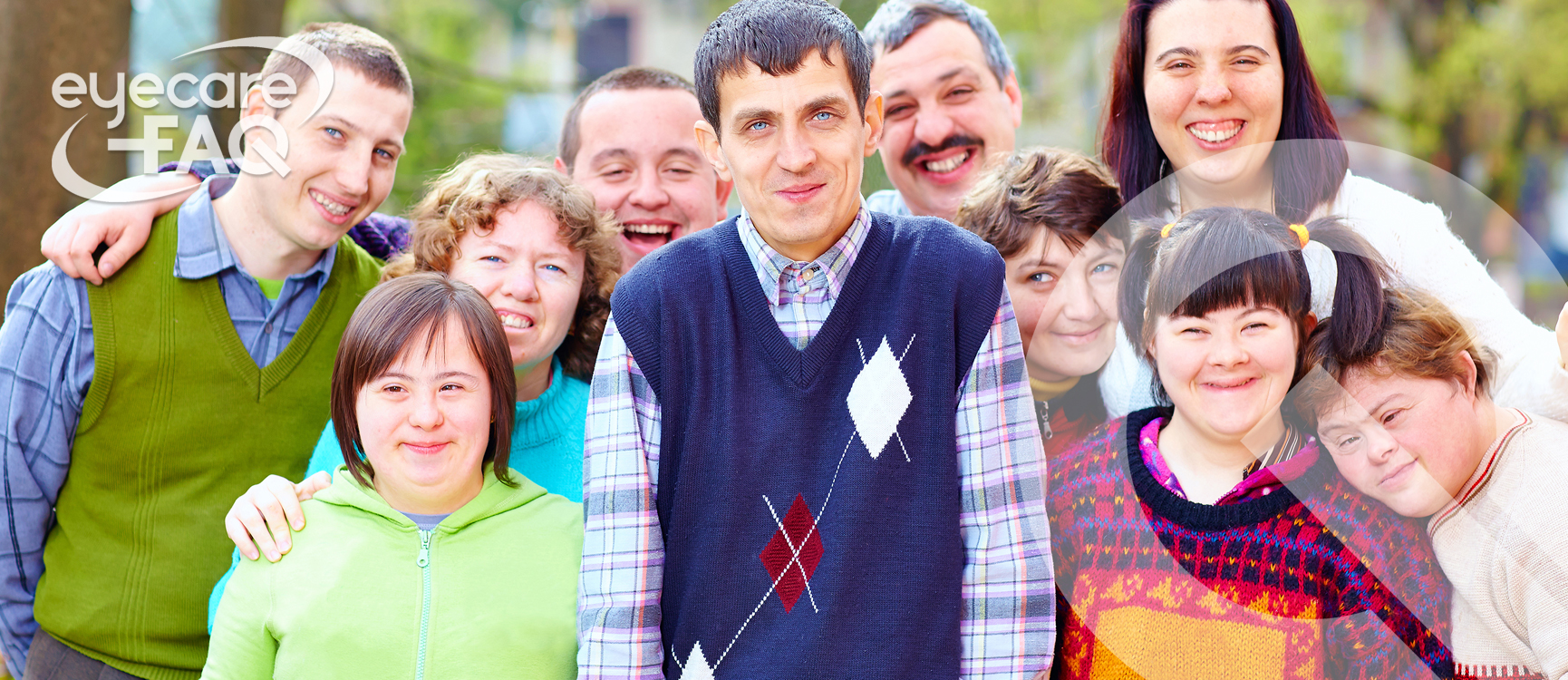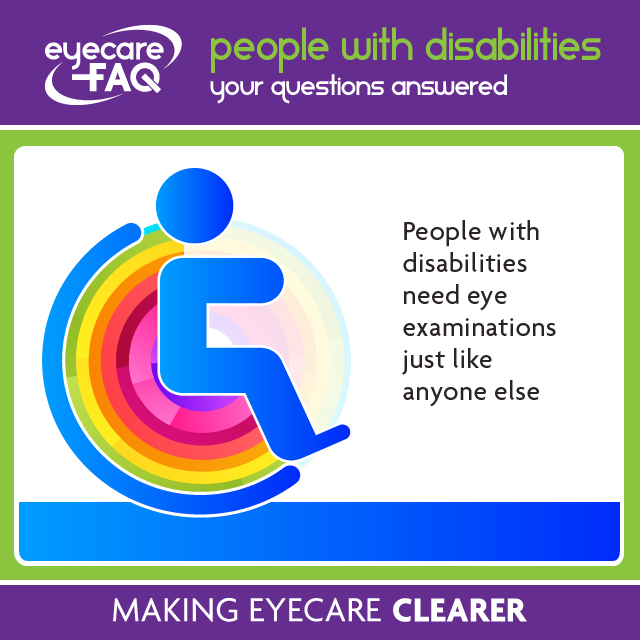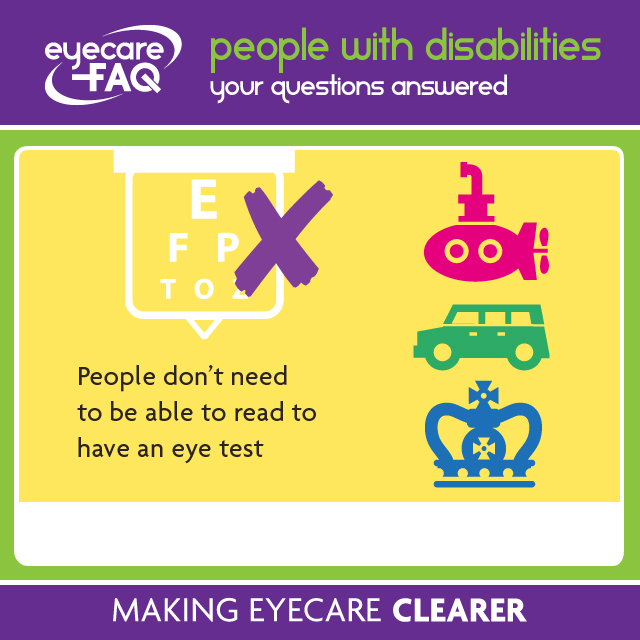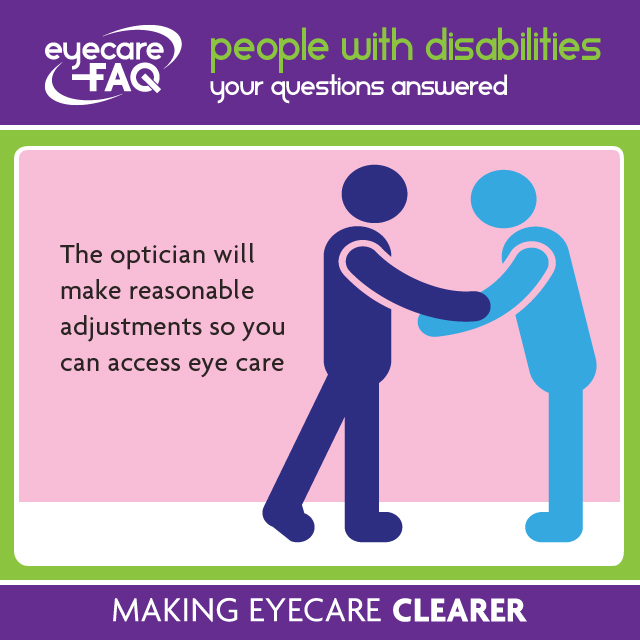Do people with special needs or disabilities need an eye examination?
Whatever your level of health or ability, you still need to look after your eyes. People with some conditions are in fact at higher risk of eye problems. If you are concerned about how to access an eye test, or you want to arrange an eye test for someone you care for, pick up the phone or visit your local optician. Explain what access you need and what difficulties you might face in getting eye care and see how the optician can help. Most practices will have an accessible testing room: ask around for recommendations too.
I care for someone who doesn’t communicate verbally – how can they have an eye test?
An eye examination is made up of a range of different tests. Some need the person to co-operate and answer questions but many can be done with minimal co-operation. The optometrist can judge how the person reacts and assess their vision that way. Some optometrists and opticians specialise in working with people with disabilities or special needs.
I am deaf – what can the optician do to make the eye test a good experience?
If you are deaf or hard of hearing, let the optical staff know what you need. If you lip read, ask them not to turn the lights off during the eye test, and face you when speaking. If you wear a hearing aid ask the dispensing optician to help you select a frame that will be comfortable.
I already have sight loss – do I still need an eye test?
Even if you are already blind or partially sighted it is important to have your eyes checked. Just because you have one eye problem, unfortunately it doesn’t rule out other problems developing. It is important to have regular tests to look after the vision that you have. You may be under the care of the hospital and they can advise on what you need. Otherwise, speak to your local optical practice staff.
Do people with disabilities have more sight problems?
People with some disabilities and medical conditions are more likely to also have sight problems. If someone has special needs, they have a higher risk of having sight problems too. Children who were born prematurely are more likely to have sight problems. Some people may have poor sight due to hereditary or genetic conditions. Some sight loss can be due to disturbances of the visual pathways inform the eye to the back of the brain. Some conditions may not have a known cause. If you care for someone who has never had their eyes checked, visit your local optician and arrange an appointment. Let the optician know what will help make the visit a good experience too.
My child has special needs and can’t tell me how well they can see – what should I look out for?
From a very early stage, children use their eyes to interact with the world around them. Even if they have disabilities or special needs it is important to get their eyes checked. If you are concerned about how your baby or toddler is interacting, speak to your GP or health visitor. A child is never too young to have an eye test, although you might want to ask for a practitioner who has experience with very young children. If your child seems to be struggling at school, rubs their eyes or complains of headaches, it is well worth getting their eyes examined, as children with special needs are more likely to have eye problems. Eye problems can sometimes make your child appear clumsy. An eye test at a local optical practice can rule out eyesight problems as a cause of your child’s difficulties. Glasses may solve problems for some children. In a few cases, an eye examination may show that your child has a problem that needs to be checked by another eye specialist. Children do not have to be able to talk to get their eyes tested, and the NHS covers the cost of children’s sight tests.
How do I find an optician who has experience of looking after people with special needs or disabilities?
If you have never taken your child / the person you care for to see an optometrist, ask around for a recommendation. Some optometrists are particularly interested in helping children with special educational needs or people with learning disabilities. Look at the website of the British Association of Behavioural Optometrists, www.babo.co.uk, and see if there is a practitioner near you.
How can I ensure that an eye examination is a good experience for someone I care for?
Make the appointment for a time of day when the person you care for is alert, not tired or hungry. Talk to them about what will happen, and practice ‘going for an eye test’, sitting on a special chair, reading letters or matching shapes, and using a torch to show how the optometrist might check their eyes. You may want to visit the practice in advance so it becomes more familiar. It can be daunting entering the eye test room if they have never seen something like this before, it is worth asking the practice if you can have a look round prior to the actual test.
If the person you care for doesn’t like the dark, is wary of strangers, doesn’t like being approached or may lash out, talk to the optical practice staff about this in advance. The optometrist will be able to adapt what they do. The optometrist should ask about the medical history and medication taken by the person you care for, and whether anyone in the family has eye problems. You might want to tell the optometrist about any problems they have focussing, headaches or other problems. An eye examination contains a number of routine parts. A good optometrist will adapt the tests to the person’s needs and abilities.
Do I have a right to an eye test if I am disabled?
People with disabilities have the right to equal access to services, and that includes eyecare. The practice staff have to make reasonable adjustments so that you can get the care you need. This could include supplying a ramp so you can enter the practice or ensuring that testing can take place downstairs. A disability does not, however, automatically mean that you qualify for an NHS sight test. Visit the NHS website to find out if you qualify.
Can the person I care for still have an eye test if they can’t read?
If someone can read letters, the optometrist will ask them to read down a chart. For people who are unsure of their letters, the optometrist can get them to match the letter they see to a card in their hand. There are also picture charts with images of common objects in varying sizes which can be matched or named. Other charts show simple shapes. ‘Preferential looking’ cards can be used with infants or children who cannot talk. The optometrist can also shine a light on the person’s eyes to estimate whether they are long or short sighted which requires minimal co-operation from the person.
What are the best frames for someone with disabilities?
There are all sorts of spectacle frames designed to help people with different needs. Some are more robust, others can be held on with a head band, while others can be adapted to fit different face shapes. Ask your dispensing optician for advice on frames to meet your needs.
What are the best lenses for someone with disabilities?
People with disabilities need good vision just like everyone else, and often they benefit from just the same type of spectacle lenses. Sometimes it can be important to have robust lenses, and there are different types of plastic that are stronger and more scratch resistant. Ask your dispensing optician for advice on lenses to meet your needs.
What help can I have if I have low vision?
People with low vision can use a number of tools to help them. At the hospital you should be put in touch with a low vision specialist who can assess you and recommend magnifiers or other technology to help you make the most of your vision. The hospital may also be able to point you towards local support groups and the right person to help from social services. Social services will assist with equipment to make day to day life easier, including speaking clocks and telephones with larger numbers. You should also ask about mobility training, which helps you get about independently.




